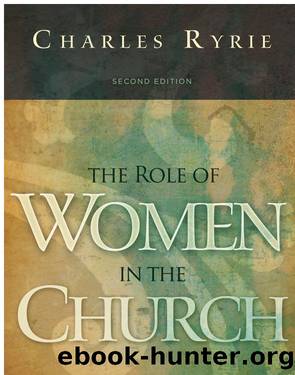Role of Women in the Church by Charles C. Ryrie

Author:Charles C. Ryrie
Language: eng
Format: epub
Publisher: B&H Publishing Group
Published: 2011-08-14T16:00:00+00:00
WIDOWS
The Old Testament often espouses the cause of the widow and orphan. God is spoken of as the judge of widows,39 and the Mosaic law pronounced a special curse upon those who afflicted widows.40 The leviratus (Lat.), that is, the marriage of a widow by her brother-in-law after the death of her husband, helped protect the rights of a widow. However, even that law made provision for releasing the brother-in-law when there were circumstances that would produce hardship on him if he fulfilled his obligation.41 As a result, Levirate marriage was neglected, and widows, left to make their own way, became the objects of charity.42 So neglected had they become at the time of Christ that the Jews had established a fund in the temple for the purpose of relief to widows and orphans.43
When some of these widows, who had been receiving support from the temple fund, were converted and joined the Christian community, the support they had been getting was naturally cut off, and the early Christians, who were also Jews, quite naturally assumed the responsibility of caring for them. Thus in the early record there appears a large group of widows supported by the church.44 It is a natural, normal, development from the Jewish background of the first Christians. Likely the practice of giving relief to widows was begun shortly after Pentecost and continued smoothly for a few months until a murmuring arose because some felt that the distribution was not being done systematically. The murmuring resulted in further organization in the church, but not of organization of the widows, for as yet there certainly was no order of widows assigned any duties in the church but only a class that was recognized as needy.
The story of Dorcas further illustrates that widows as a class were prominent in other Christian communities.45 It also indicates that these widows were nothing more than the recipients of relief and were not bound together in any sort of order—the only bond being their common need. That Dorcas herself was a widow need not be assumed. Luke’s probable meaning is that she devoted herself to charitable work and that the widows who came to lament over her body were those who had profited from her work. Dorcas was probably instructed to do such work by her knowledge of the Old Testament and the example of Jesus,46 and these would be sufficient motives to account for the naturalness of the account in Acts. The story further emphasizes the fact that there is no record of the widows’ ministering in any way to the church in return for the relief given them. There was no order at that time.
The locus classicus, however, concerning widows in the New Testament is 1 Tim 5:3–16. By the time that Paul wrote this epistle in the mid-sixties of the first century, provision was made for a definite order of widows with specific requirements for admission. There are problems, however, in the passage, and they center in two questions: (1)
Download
This site does not store any files on its server. We only index and link to content provided by other sites. Please contact the content providers to delete copyright contents if any and email us, we'll remove relevant links or contents immediately.
A World Ablaze by Craig Harline(703)
Winning the War in Your Mind by Craig Groeschel(697)
White Too Long by Robert P. Jones(642)
In the Reign of King John by Dan Jones(638)
The Mission by David W. Brown(631)
History of the Church by Eusebius(610)
Beautiful Resistance: The Joy of Conviction in a Culture of Compromise by Jon Tyson(596)
No More Christian Nice Guy by Paul Coughlin(589)
A Spacious Life by Ashley Hales(566)
Three Messiahs : The Historical Judas the Galilean, the Revelatory Christ Jesus, and the Mythical Jesus of Nazareth (9781450259477) by Unterbrink Daniel T(559)
The Crusades: A History by Jonathan Riley-Smith(557)
The Black Church by Henry Louis Gates Jr(548)
The History of Palestine by John Kitto(515)
The Zionist Bible (BibleWorld) by Masalha Nur(512)
The Tale of the Tardy Oxcart (Swindoll Leadership Library) by Swindoll Charles R(507)
Why Study History? by John Fea(505)
Assassination of a Saint by Eisenbrandt Matt(487)
Descent Into Hell by Charles Williams(484)
The Cheese and the Worms: The Cosmos of a Sixteenth-Century Miller by Carlo Ginzburg(471)
